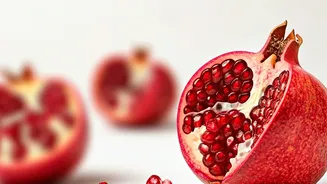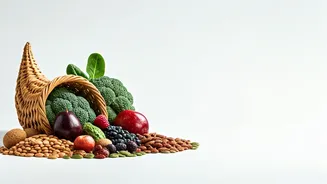Oats: Heart's Best Friend
Oats are a soluble fiber powerhouse, working wonders for your cholesterol levels. This fiber, when consumed, creates a gel-like substance in your digestive
system, which traps cholesterol and prevents its absorption. Regular oatmeal consumption, as part of a balanced diet, has been shown to reduce LDL (bad) cholesterol. Consider starting your day with a bowl of oatmeal, and you can also add oats to your smoothies or use them in baked goods to increase your fiber intake. Aim for at least 5-10 grams of soluble fiber daily to experience the benefits of oats and keep your heart healthy. Studies show that people who consume oats regularly can see a significant reduction in their cholesterol numbers over time. Adding fruits and nuts will enhance their palatability.
Beans: The Fiber Powerhouse
Beans, the humble legume, are rich in soluble fiber. Like oats, this fiber helps to bind cholesterol in your digestive system, preventing its reabsorption into your bloodstream. Moreover, beans are also an excellent source of protein, which can help you feel full, thus potentially preventing overeating and the consumption of unhealthy fats. Various types of beans, such as kidney beans, black beans, and chickpeas, offer diverse nutritional profiles and culinary versatility. Incorporating beans into your diet is simple. They can be added to soups, salads, and stews. Consuming half a cup of beans daily can contribute significantly to lowering your cholesterol levels. Adding beans is a straightforward, cost-effective way to improve your heart health by making a dietary modification.
Nuts: Healthy Snack Choice
Nuts, particularly almonds, walnuts, and cashews, are beneficial for reducing LDL cholesterol. These nuts contain healthy fats, fiber, and plant sterols, all of which contribute to lowering cholesterol levels. Plant sterols, in particular, are structurally similar to cholesterol, which enables them to compete with cholesterol absorption in the gut. The American Heart Association recommends that you consume a handful of nuts per day, as it is associated with a lower risk of heart disease. When selecting nuts, prioritize unsalted varieties to minimize sodium intake. Nuts are a simple and delicious snack, ideal for carrying around and consuming when needed. Be mindful of portion sizes, as nuts are high in calories. Nuts are a convenient way to boost your heart health on a daily basis.
Fatty Fish: Omega-3 Boost
Fatty fish, such as salmon, mackerel, and tuna, are rich in omega-3 fatty acids. These essential fats offer a range of heart-health benefits, including lowering triglycerides (another type of fat in your blood), reducing blood pressure, and reducing the risk of blood clots. Omega-3s also help increase HDL (good) cholesterol. The American Heart Association recommends eating at least two servings of fatty fish per week. Consider grilling, baking, or poaching fish to maintain its nutritional value. Incorporate fatty fish into your diet by including it in various meal plans. Consuming fish is a delicious method of improving your cholesterol profile and supporting overall cardiovascular health.
Avocados: Good Fats Included
Avocados are packed with monounsaturated fats, which are beneficial for lowering LDL cholesterol while increasing HDL cholesterol. These creamy fruits also contain fiber and plant sterols, similar to nuts, which further help in lowering cholesterol. Avocados are versatile. You can add them to salads, sandwiches, or enjoy them as a dip. They provide a satisfying and healthy addition to any meal. A study shows that consuming one avocado daily can significantly reduce LDL cholesterol levels in people with overweight and obesity. Integrating avocados into your daily diet is a delicious and efficient way to boost your heart health. Adding avocados to your diet can be a sustainable and enjoyable change for your health.














